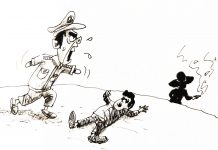During the search for a local university college dean, an exemplary candidate with an impeccable background was passed over in favor of one less able, simply because the latter had the right friends on the Board of Trustees. Politics, erstwhile taken as the exclusive domain of smoke-filled backrooms of power, has insidiously crept into all the corners of human activities, smudging not only institutions but even the very principle of justice, which erstwhile stood at its highest level.
In academe, where reason is supposed to hold sway, politics is practiced like a stealthy puppeteer pulling strings from behind the scenes. Professors compete for department chairmanship not so much on merit but on loyalty; research grants may not reach deserving hands but go to those connected. It is not uncommon to discover gifted young scholars wither away on the margins, victims of a culture that worships genius but rewards loyalty to the right camps even more. The currency that buys opportunity is not genius but support.
The world of sports is no different. Observing local sporting competitions, one would imagine that medals shine only because of the players’ sweat and ability, but behind the scenes, power brokers ghost around. National teams are selected not necessarily on merit but on patronage; funds are distributed based on who knows whom. The sport, once a sacred ground on which raw will could prevail, now has unpictured paths—smooth and tarmacked for some, craters and boulder-filled for others—dependent on who you are and whom you have rooting for you in the boardrooms. What once were supposed to be neat battles of will and muscle have since turned into politicized spectacles in which rulings at times smell of something other than simple sporting ability.
Business, that vaunted sanctuary of unfettered competition and innovation, forays as well into the waters of politics with a muddy tint. A company might have an innovative idea, but without suitable political favoring—the nod from regulatory bodies or the seal of city councils—it can wither and perish as inferior projects flourish with “influences.”. Licenses, permits, contracts: less to do with how firm your grip is at the golf outing or charity gala and more to do with how firm your offer is. Politics has less to do with public speeches and more to do with private nods and reciprocal manipulation of influence—a reminder of just how deeply the roots of backroom deals and favoritism have entwined what was originally a meritocratic earth.
Even religion, which is meant to feed souls and lift hearts, is politicized. I have watched churches divide, not over doctrine or profound theological issues, but because cliques within them battled like senators over a strip of contested territory. Leadership positions in religious organizations, meant to be callings of service and humility, sometimes become thrones contended for and defended. Here, spirituality is tainted by the fingerprints of power struggles, a tragic watering down of the spiritual into the worldly.
The arts, that final stubborn sanctuary for free spirit and dissent, fare no better. In state-funded cultural productions, the hand of politics frequently dictates which plays are produced, which artists are patronized, and which museums are restored. Art, if it is to be the mirror of society, can also become a billboard for politics. Brush work and lyrics in songs are no longer gauged by depth or by honesty, but by whether they are permissible or not, politically. When politics intrude into art, it does not censor, but it amputates the soul of creativity itself.
At its core lies a stern but uncomplicated truth: politics is not a solo endeavor; it is an intricate phenomenon that utilizes human desire, fear, and belonging to achieve things, sometimes clear, sometimes unobvious. It plays its way through institutions, distorts their purposes, and tends to leave people disillusioned in its path. We pretend these are just a few scattered instances, that the rot isn’t deep, but each phony vote, each unwarranted appointment, each unearned promotion makes a fissure in the thin glass of confidence beneath which we all live. If we’re to halt this silent, relentless landslide, we can start not by assuming politics can be wiped clean in its totality, but by insisting on better politics—ones based on merit, transparency, and genuine service.
Integrity must once more be greater than a cosmetic campaign slogan recycled for the duration of speeches; it must be the currency of rise in all fields. We work towards the restoration of the innocence of intent that government, education, sport, business, religion, and the arts were originally intended to represent.




